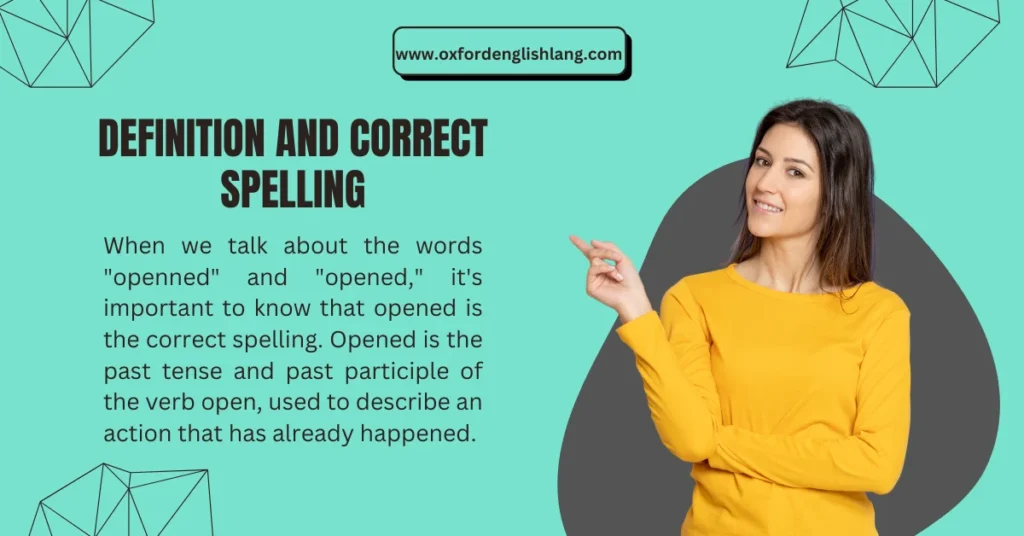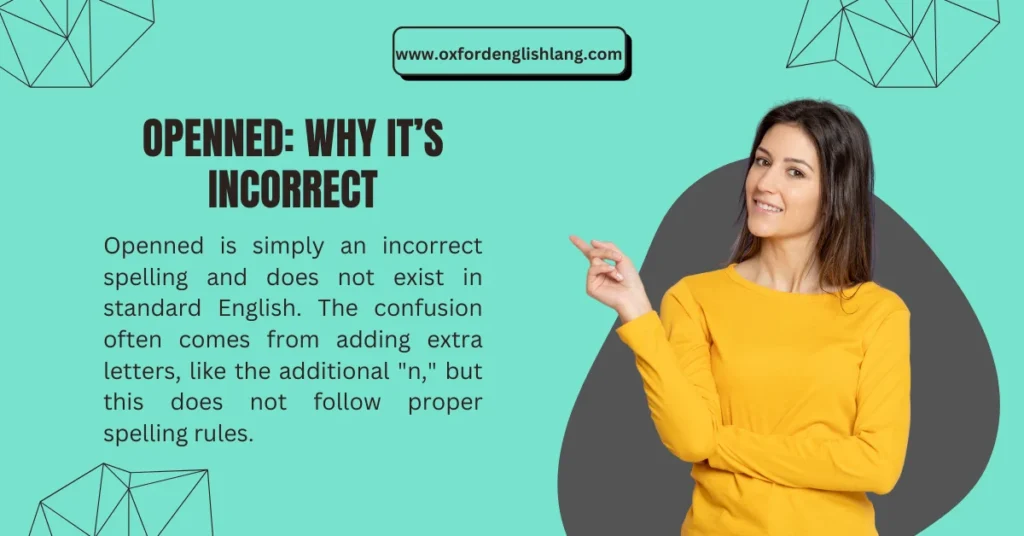When it comes to spelling and grammar, even the most seasoned writers can make mistakes, especially with words like “openned” and “opened.” The distinction between these two is both clear and impactful. “Opened” is the correct past tense of the verb “open,” used in sentences like, “She opened the door at 9 AM.”
On the other hand, “openned” is a common misspelling that should be avoided. Paying attention to such details in writing ensures credibility and leaves a positive impression in professional or academic contexts.
Through practicing and learning patterns in the English language, you can confidently describe actions with the right verbs and spelling. For instance, saying, “The company opened a new branch in the city” conveys the message effectively, while “openned” might cause confusion.
By mastering this, you’ll enhance your skills and avoid pitfalls in communication, whether it’s writing a polished article, a business correspondence, or even a casual note. Remember, dedication to accuracy and clarity in contexts is what makes your work stand out.
Openned or Opened? Which one is correct?
When it comes to spelling, the correct form is opened, not openned. Opened is the past tense and past participle of the verb open, used to describe an action that has already occurred. In English, openned is an incorrect spelling and should be avoided in proper writing or communication.
Definition and Correct Spelling

When we talk about the words “openned” and “opened,” it’s important to know that opened is the correct spelling. Opened is the past tense and past participle of the verb open, used to describe an action that has already happened.
For example, you might say, “She opened the door” or “He opened the box.” Using the right spelling ensures that your messages are clear and easily understood, whether in writing or in conversations.
In my experience, students often confuse openned with opened. This can be avoided by paying attention to grammar and using the correct definition. Whether you’re discussing a meeting or window, using opened correctly helps in professional communication and ensures your words are clear.
Always remember to use the right spelling to maintain professionalism in your writing and conversations.
Openned: Why It’s Incorrect

Openned is simply an incorrect spelling and does not exist in standard English. The confusion often comes from adding extra letters, like the additional “n,” but this does not follow proper spelling rules.
For example, saying “She openned the door” is wrong. The correct usage would be “She opened the door.” Using the right spelling helps avoid mistakes and ensures your communication is clear and accurate.
You Might also like: Emersion Vs Immersion: Discover the Powerful Difference
Everyday Usage Examples
Scenarios in Daily Life
In everyday life, we often use the word opened to describe actions that make things accessible or available. For example, at home, you might say, “She opened the door to let the guests in” or “He opened the fridge to grab a drink.” These are simple situations where the word opened clearly shows the action of making something accessible.
Scenarios in Business and Technology
In both business and technology, the correct use of terms is essential for clear communication. For example, when discussing a project, professionals often refer to terms like launch, activation, and platforms.
A company may launch a new software application to improve systems or introduce a digital service to enhance customer experience. The CEO might oversee the activation of new services or systems, ensuring that the project runs smoothly and that every action is executed correctly.
In a business context, it’s important to use the right terminology when describing actions. For instance, when opening a new branch or office in a city, the company must ensure that all spelling and terminology are correct to avoid confusion.
Similarly, in technology, using terms like opened and launched in the right context is crucial for clarity. Students and professionals alike need to remember that using correct terms can greatly improve communication and help convey intentions more effectively.
The Role of “Opened” in Different Contexts
Literature and Art
In literature and art, the word opened is often used in a metaphorical way to convey deeper ideas and meanings. For instance, a book can open up new perspectives and ignite imagination, taking readers to different places and making them reflect on important societal issues.
Similarly, an artist might say their work has opened a conversation about social matters, sparking dialogue and emotions in the audience. This powerful use of words helps convey complex ideas and makes art and literature more meaningful. By understanding how opened is used in this way, students can improve their analysis of these works, making them feel more alive and impactfu
Sports and Events
In sports and events, the word opened is often used to mark the beginning of something exciting or important. For example, when a stadium opens, it signals the start of a big event or competition. Similarly, an athlete may say they opened their performance with a strong move, indicating the start of their action.
This use of opened helps set the tone for the event, creating a sense of anticipation and excitement. Whether it’s the opening of a game, a new season, or a ceremony, the word opened plays a key role in making the event feel more dynamic and engaging for both participants and audiences.
You Might also like: Targetted or Targeted? Master Spelling Today!
Frequently asked question
Why is “openned” not a valid word in the English language?
“Openned” is not a valid word because it is a misspelling of “opened.” The correct form of the past tense and past participle of the verb “open” is “opened.” The extra “n” in “openned” doesn’t follow English spelling rules.
How can one improve their spelling skills to avoid using incorrect words like “openned”?
To improve spelling skills, practice reading and writing regularly, use a dictionary to check unfamiliar words, learn common spelling rules, and engage in spelling exercises. Also, pay attention to context and word patterns.
What can I say instead of opened?
Instead of “opened,” you can use words like “unlocked,” “unsealed,” “initiated,” “launched,” “started,” or “unveiled,” depending on the context.
What is the past perfect tense of open?
The past perfect tense of “open” is “had opened.” For example, “By the time we arrived, the store had opened.”
What is the proper tense of open?
The proper tense of “open” depends on the context. The present tense is “open,” the past tense is “opened,” and the future tense is “will open.”
What’s another way to say opened up?
Instead of “opened up,” you could say “unveiled,” “revealed,” “unlocked,” “started,” or “initiated,” depending on the context.
What does the idiom open to mean?
The idiom “open to” means being receptive or willing to consider something. For example, “She is open to new ideas.”
What is the phrasal verb of open?
A common phrasal verb for “open” is “open up,” which can mean to start a conversation, become more honest, or make something accessible. For example, “He opened up about his feelings.”
Conclusion
In conclusion, understanding the correct use of the word “opened” and its variations is crucial for clear and effective communication. By distinguishing between the proper spelling and usage, such as avoiding the incorrect form “openned,” individuals can improve their spelling and grammar skills. Whether it’s in business, literature, sports, or technology, knowing how to use “opened” correctly ensures that your message is precise, meaningful, and easily understood. Additionally, expanding your vocabulary with synonyms and learning about related idioms and phrasal verbs will further enhance your ability to communicate confidently and accurately. With consistent practice and attention to detail, anyone can master the use of words like “opened” and continue to improve their language skills.

Henry brings a unique blend of expertise and enthusiasm to the world of English language learning. Specializing in grammar, writing, and linguistics, He crafts content that makes language concepts relatable and useful for both beginners and advanced learners. With a focus on practical application and continuous improvement, Henry encourages readers to see English not just as a subject but as a powerful tool for expression and success.


